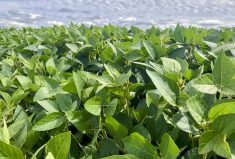Buenos Aires | Reuters — Argentine farmers started a five-day crop sales strike on Monday, part of an election-year push in the world’s No. 3 soybean exporter to change policies that they say have killed profits under outgoing President Cristina Fernandez.
The country is the biggest international supplier of soybean livestock feed, which has helped Asia’s emerging middle class shift its diet away from rice and toward meat.
The strike is not expected to impact Argentine grain supply, as ports have enough stock to keep shipments flowing this week.
Read Also

Alberta crop conditions improve: report
Varied precipitation and warm temperatures were generally beneficial for crop development across Alberta during the week ended July 8, according to the latest provincial crop report released July 11.
But growers say they will increase protests as the October presidential election nears. They want the next leader to ditch the export limits that the government puts on wheat and corn, as well as the 35 per cent tax imposed on soybean exports.
Farmers say the tax puts them at a disadvantage against competitors in Brazil and Paraguay, and that their problems are compounded by a peso currency kept artificially strong by government interventions in the foreign exchange market.
“The balance of what this government has done is absolutely negative,” Luis Miguel Etchevehere, head of the Argentine Rural Society farm chamber, told local media.
Fernandez is constitutionally barred from running for a third consecutive term in the Oct. 25 election. Front-runner Daniel Scioli, who is from her party, has not laid out his farm platform but vows to be “flexible” in revising policies that are not working.
Analysts say consumer prices in Argentina are rising at close to 30 per cent per year, pumping up the cost of farm production. Scioli says he would reduce inflation to single digits by the end of his first four-year term.
Running second in opinion polls is Mauricio Macri, a free-markets proponent who says he would reduce corn and wheat export curbs, which under current policy can be raised or lowered throughout the year. Growers say this policy leads to uncertainty that makes crop planning difficult.
No matter who wins the presidency, the soybean export tax may have to remain in place next year because the government is running deficits and needs the money.
“The next government will not be able to touch the soybean export tax in 2016,” Alfredo Paseyro, head of the Argentine Seed Venders’ Association, told Reuters. “If you think otherwise, you’re dreaming.”
— Reporting for Reuters by Hugh Bronstein and Walter Bianchi.















